Key takeaways:
- Reparations politics is about acknowledging historical injustices, validating suffering, and fostering healing beyond mere financial compensation.
- Historical context reveals ongoing struggles for justice stemming from slavery, colonization, and systemic discrimination, emphasizing the need for recognition and redress.
- Arguments for reparations include moral responsibility, the quest for justice, and potential socioeconomic benefits for marginalized communities.
- Case studies from Germany, Namibia, and Chicago illustrate diverse approaches to reparations, highlighting the importance of addressing historical traumas and building trust in society.

Understanding reparations politics
Reparations politics is a complex interplay of historical injustices and contemporary moral considerations. I often find myself reflecting on how deeply personal traumas can shape collective memory, influencing today’s conversations about justice. When I think about my own family history and the stories passed down through generations, it becomes clear how unresolved issues from the past continue to resonate in the present.
What strikes me is the emotional weight behind reparations discussions. Many people view reparations as a simple financial transaction, but it transcends monetary compensation; it’s about acknowledging pain and restoring dignity. I recall a conversation with a friend whose ancestors were affected by colonization. He passionately explained how financial redress could never fully heal those wounds but, at the very least, could validate the suffering many have endured.
As I engage with various perspectives on reparations, I’m often left to ponder: what does true justice look like? I believe it’s crucial to consider whether reparations might serve as a pathway to healing or simply evoke more division. The conversations surrounding reparations challenge us to confront uncomfortable truths, pushing us to ask not only who is responsible for the past but also how we can collectively forge a more equitable future.
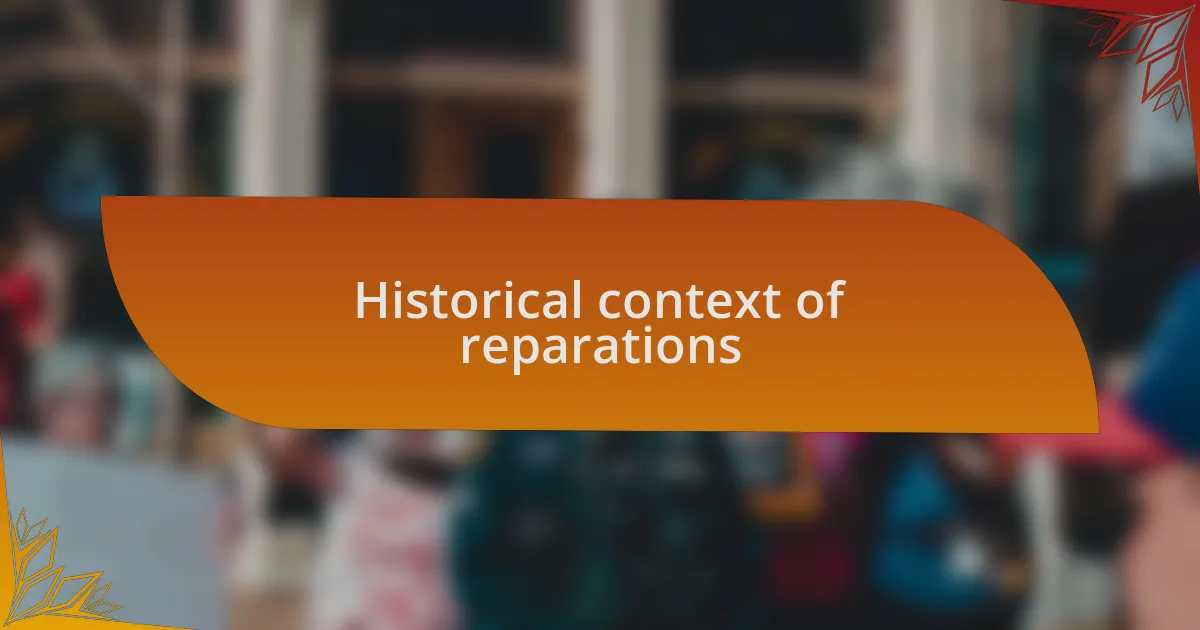
Historical context of reparations
The historical context of reparations is deeply rooted in the legacies of slavery, colonization, and systemic discrimination. I often think about how the aftermath of these injustices hangs heavily over communities, reflecting not just in economic disparities but also in cultural identities. For instance, when I learned about the reparations debates in the post-Civil War United States, it seemed clear to me that the initial failure to address these injustices set the stage for ongoing inequities.
Looking back, I can’t help but feel a profound sense of sorrow for the lost opportunities. The reparations movements across different nations, from Germany’s restitution for Holocaust survivors to the United States’ ongoing discussions about African American reparations, reveal a common thread: the need for recognition and redress of historical wrongs. These movements prompt me to ask, how does acknowledging the past contribute to building a fairer society?
When I reflect on the historical narratives surrounding reparations, I’m struck by how they echo through time, influencing current policies and societal attitudes. I remember reading about the Native American tribes fighting for reparations related to land loss and broken treaties; it highlighted the continuous struggle for justice and the complex relationship between acknowledgment and healing. This historical backdrop serves as both a catalyst and a barrier in today’s reparations discourse, urging us to confront uncomfortable truths about our collective history.
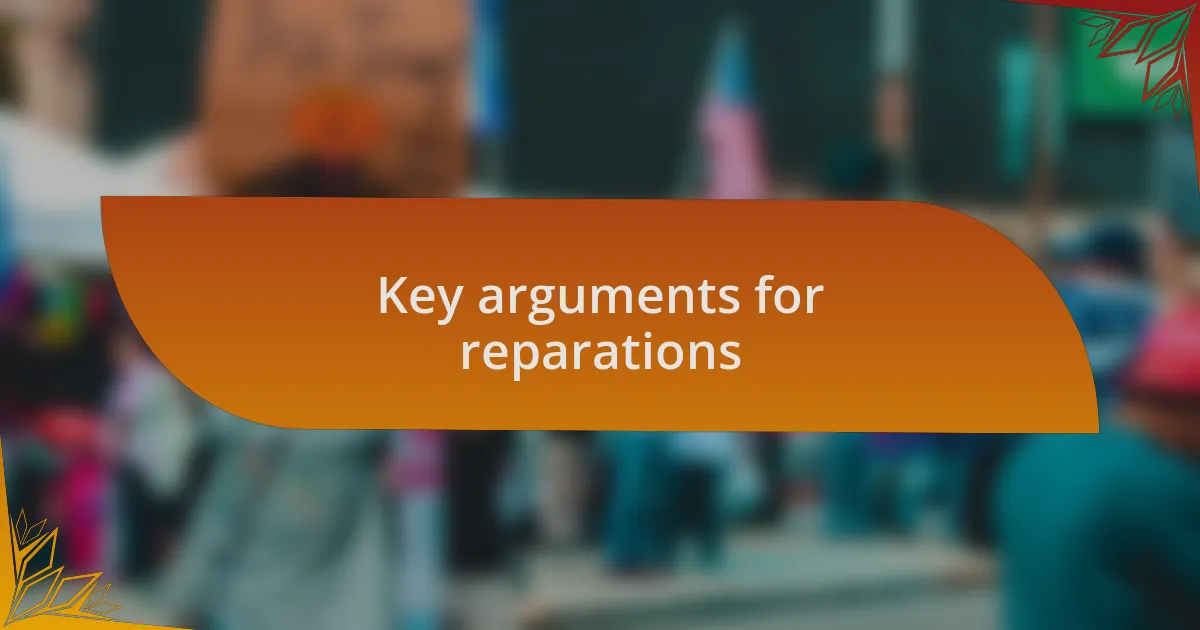
Key arguments for reparations
One of the key arguments for reparations centers on the notion of justice. I often find myself pondering the idea that if we are to live in a just society, we must address the harms inflicted on marginalized communities. By providing reparations, we acknowledge that the historical injustices have lasting impacts that require both recognition and restitution, creating a pathway toward remedying some of the economic and social harms experienced over generations.
Another critical argument revolves around the concept of moral responsibility. It’s hard for me to ignore the reality that many enjoy privileges built on the backs of oppressed populations. When I reflect on this, it raises the question: how can we, as a society, seek to move forward while leaving behind unresolved injustices? Reparations, in this light, become more than just a financial transaction; they represent an effort to rectify historical wrongs and foster healing.
Additionally, there’s a strong argument regarding the socioeconomic benefits of reparations. I’ve seen firsthand how economic disparities can stifle entire communities, influencing everything from education to healthcare. Could investing in reparations actually lead to a more equitable society? By channeling resources into historically marginalized groups, we can cultivate opportunities that contribute to a more balanced economic landscape, benefiting everyone in the long run.
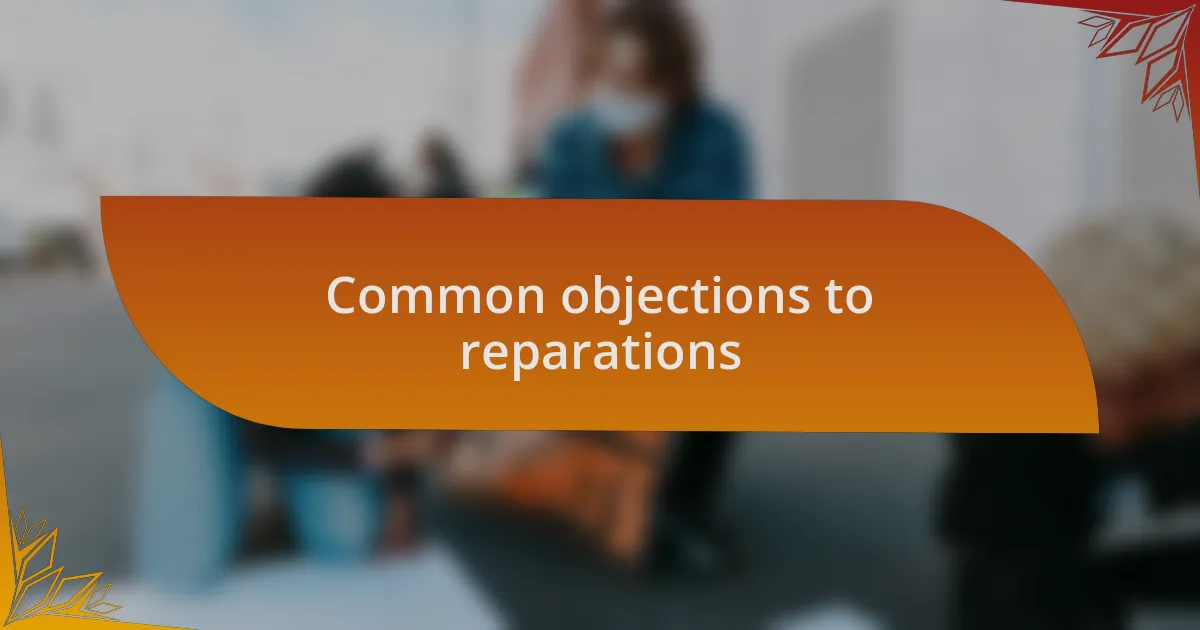
Common objections to reparations
One common objection to reparations is the belief that it would unfairly penalize individuals today for injustices committed by their ancestors. When I hear this argument, I can’t help but think about how children often inherit both wealth and social status, as well as disadvantages. Isn’t it slightly contradictory to argue against reparations on the premise of unfairness while simultaneously benefiting from historical inequities that are very much present today?
Another frequent point of contention is the idea that reparations are impractical and that the logistics of distributing financial compensation are too complex. As someone who has navigated bureaucratic systems, I understand the challenges involved. However, I often wonder: shouldn’t we at least try to create a framework for this discussion rather than dismissing it outright? Complexity shouldn’t be a reason to shy away from justice; sometimes, tackling difficult issues brings forth innovative solutions.
Some critics argue that reparations could fuel division rather than unity within society. I can see how this concern arises, especially in conversations around a topic as emotionally charged as reparations. But isn’t it worth considering that confronting our past might actually pave the way for dialogue and understanding? Rather than deepening divisions, could reparations serve as a catalyst for a more inclusive narrative that benefits everyone?
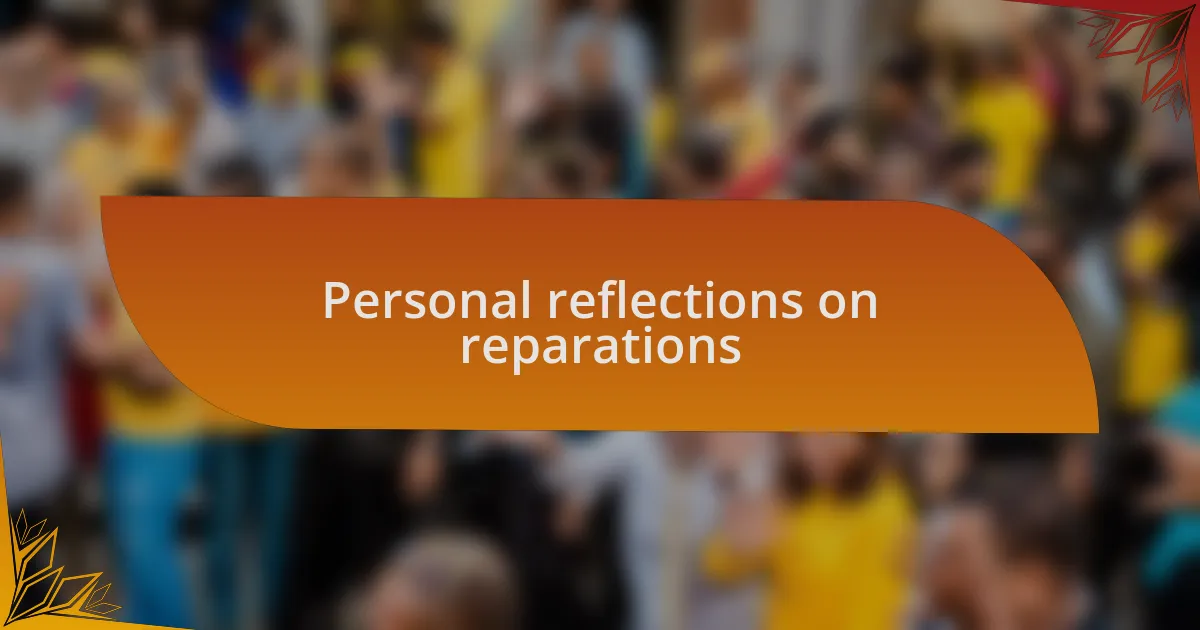
Personal reflections on reparations
When I reflect on the topic of reparations, I can’t help but think about the stories of my ancestors. Knowing that their struggles helped shape the life I lead today brings a complexity to the idea of reparations—does acknowledging this history mean I have a responsibility to support those who are still feeling the impacts of systemic injustices? For me, it’s not merely about financial compensation, but about acknowledging pain and contributing to healing.
I remember a conversation with a friend who grew up in a neighborhood deeply affected by historic disenfranchisement. He spoke about the lost opportunities that affected not just his family, but generations. Listening to him made me realize that reparations could represent something far more significant—an opportunity to address wrongs and invest in futures. What would it look like if we shifted the narrative from blame to partnership in rebuilding?
One evening during a community discussion, a participant posed a troubling question: “What do we owe each other, really?” In that moment, I felt a wave of urgency. Instead of shying away from the discomfort, I believe we should embrace it, using it as a foundation for rebuilding connections. Reparations can serve as a bridge to understanding, challenging us all to rethink our roles in addressing past injustices and promoting a more equitable society.
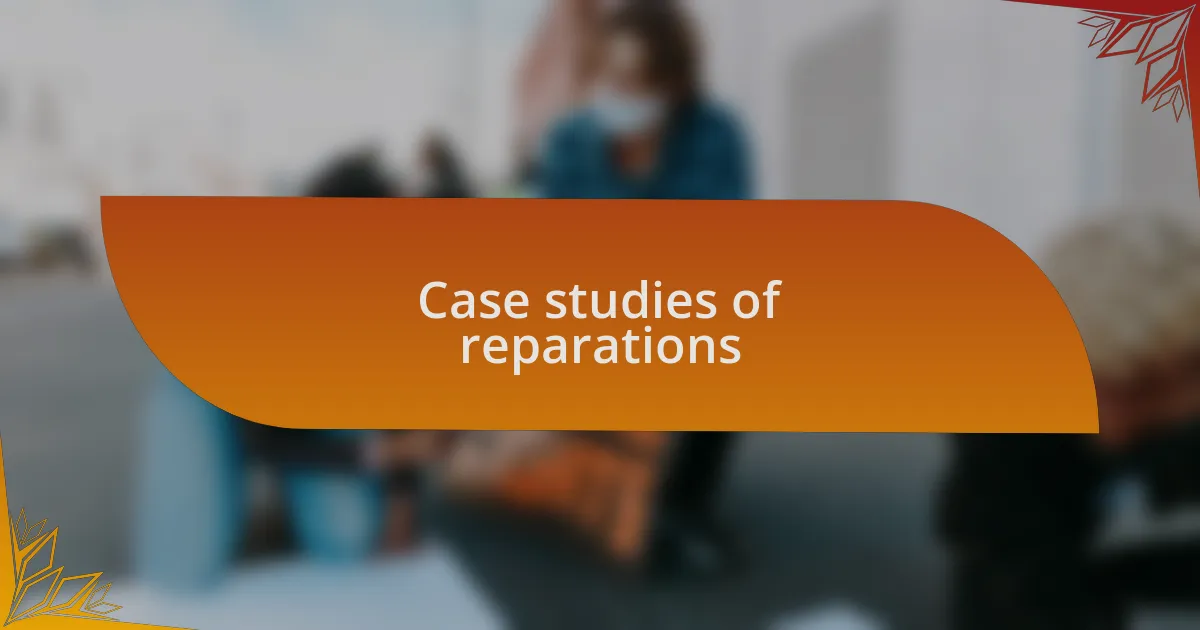
Case studies of reparations
Case studies of reparations reveal diverse approaches to addressing historical injustices. For instance, the case of Germany’s reparations to Holocaust survivors highlights the significance of acknowledging past atrocities. Their structured payments not only provided financial support but also served as a public recognition of suffering—an essential step in healing.
In Namibia, the reparations sought from Germany for the genocide committed against the Herero and Nama people reflect an ongoing struggle. Hearing stories from Namibians who endured such historical oppression reminds me of the intertwined fates across generations. Is it enough to issue an apology when the scars run so deep?
Closer to home, the city of Chicago’s initiative to allocate funds for communities affected by police violence is another poignant example. When I learned about the outreach programs aimed at rebuilding trust, I couldn’t help but ponder—can we truly mend relationships without addressing the financial and emotional fallout that accompanies such injustices? These case studies serve not just as lessons, but as calls to action for us all.
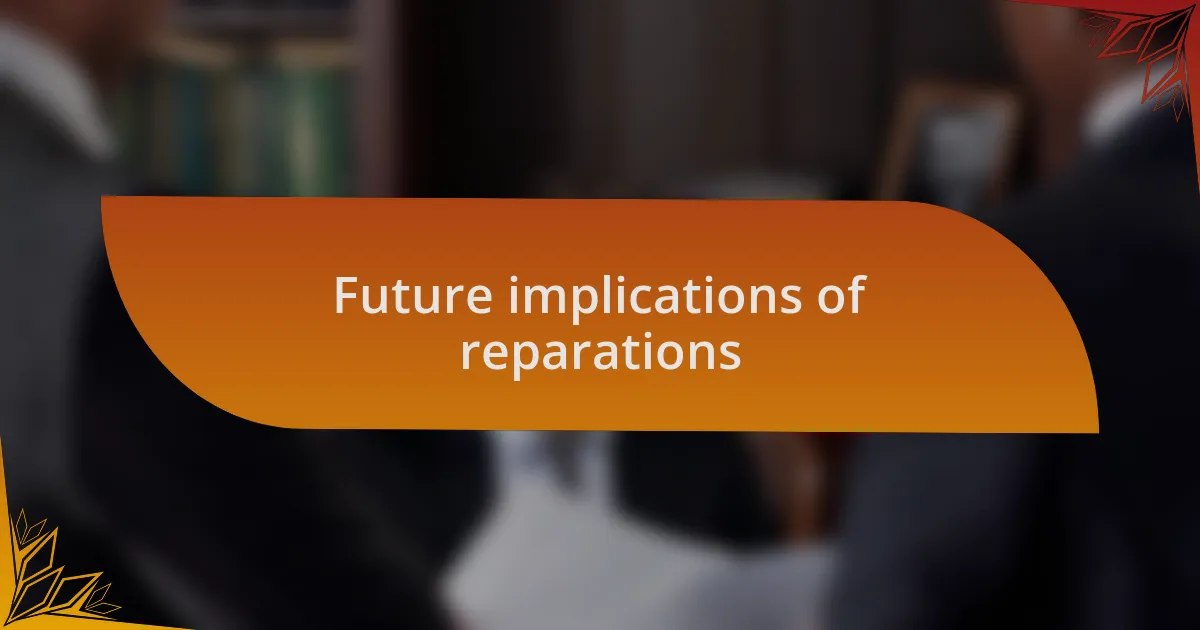
Future implications of reparations
The future implications of reparations are profound and multifaceted. I often find myself thinking about how reparations could shape societal structures, potentially fostering greater equity and inclusion. For instance, if reparations lead to comprehensive education reform, addressing systemic biases, we might see a significant shift in social dynamics and opportunities for marginalized communities.
Imagine a future where reparations not only provide financial compensation but also promote cultural revitalization. I recently spoke to a historian who envisioned reparative justice as a means to revive languages and traditions that were suppressed. Could such efforts help bridge cultural divides and promote understanding among diverse populations?
Moreover, the question of accountability is paramount. I’ve observed that reparations can compel institutions to confront their past, challenging them to redefine their mission. What if corporations and governments began to include reparations in their core values, leading to real policy changes? This could catalyze a broader societal transformation, encouraging a culture of responsibility and healing.